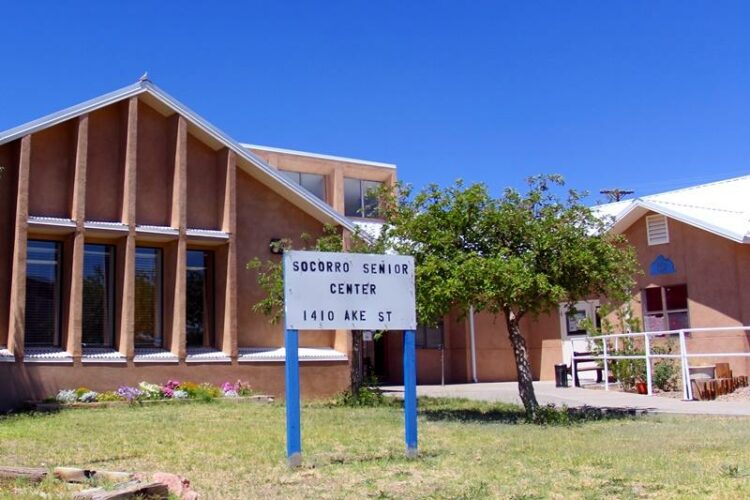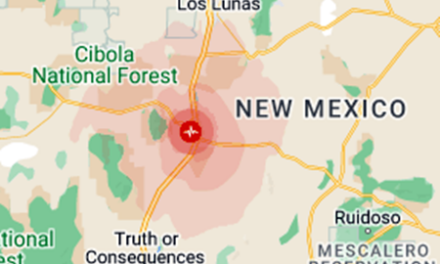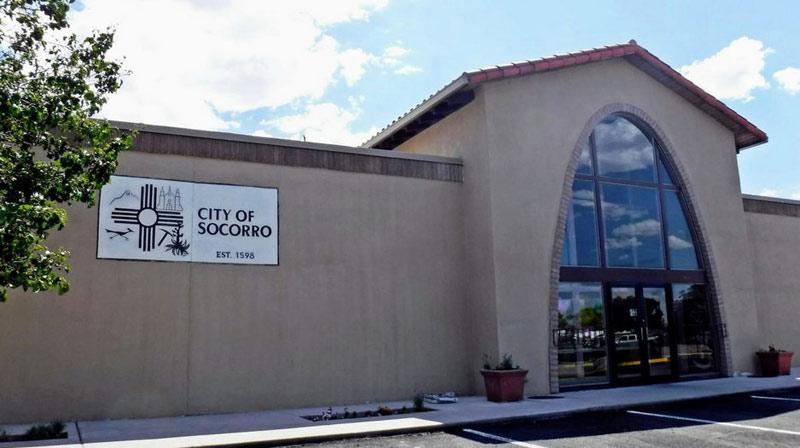The state of New Mexico will take over Socorro County’s senior centers after the county used inmate labor to prepare senior center meals.
Socorro County Manager Michael Hawkes has been informed by the state agency that oversees senior programs that the county can no longer provide services after March 17. Hawkes said in an interview last Friday that the Non-Metro Area Agency on Aging is taking the action because it disapproved of the county using detention center inmates to assist in food preparation.
In a letter dated Feb. 9, the Non-Metro AAA informed Hawkes and Socorro Senior Center Director Salina Lopez said that the state will be taking over Socorro’s senior services beginning March 18.
The letter said the county’s use of detention center inmates for food services at the senior center without prior approval by Non-Metro AAA is a violation of the county’s agreement.
“Socorro County is authorized to continue providing services for older adults through March 17, 2023, so long as inmates are not used as meal preparers during that time,” the letter stated. “Socorro County is also hereby authorized to incur costs associated with Title III service provision through March 17, 2023.”
The letter cited three major factors for taking the action:
- Violating its Standards and Policies, including written approval required for subcontracting (the approved subcontract was with Summit Foods, not the detention center); Incident Reporting for circumstances which may lead to litigation; Various provisions of Provider Personnel Requirements; and Various provisions of the Consumer Rights Policy.
- Potential violation of the New Mexico Administrative Codes, citing that while the county obtained food handler certifications for the inmates, they were not trained in the dietary allowance requirements or practices for aging services, as outlined in NMAC.
- Third, the use of jail inmates as meal preparers in a senior center is not customary and may pose safety risks to older adults. It is reasonable for Non-Metro AAA to expect Socorro County to notify and seek evaluation of the practice prior to its implementation, in order for both parties to protect the health, safety and welfare of this vulnerable population. Unfortunately, the following actions of Socorro County demonstrate a lack of concern and safety for the older adults enrolled in the county’s program.
The county stopped using the trusties the next day.
Socorro County Attorney Adren Nance refutes the allegations.

Socorro Senior Center. 1410 Ake Avenue.
File photo
“It became clear in our meeting with NM AAA on February 10 that they do not have a plan to move forward or to take care of the seniors,” Nance stated. “It was also made clear that the allegations set forth in their letter … are pre-textual as they did not allow for a cure, as no cure was necessary as the County’s trusty program ceased as soon as a concern was raised.”
Even so, Nuance said, “AAA elected to terminate the contract on the no-fault provision because they cannot substantiate the allegations and because the County did nothing wrong.”
Hawkes said the decision to use detention center trusties for food prep was made because of funding issues.
“Since we couldn’t afford to hire any more employees, the county set up a pretty tight program where they got trusties food certified with the State of New Mexico, as far as food prep goes,” Hawkes said. “We actually had to cancel our contract with our food provider, Summit, because we just couldn’t afford to continue paying those fees. A crate of lettuce used to be $180. Now it’s $1,800. We couldn’t even serve salads anymore.”
He said trusties from the detention center were in the kitchen beginning Feb. 6 to offset rising costs of foodstuffs.
“They were well-vetted and are not hardened criminals,” Hawkes said. “They are the ones the detention center has identified as people who will not partake in mischief and have a good background. We established a five-page protocol of what needed to happen at the site. Very stringent rules were followed.”
He said detention center personnel were onsite and guidelines were given to each trusty on what they could or could not do.
“Actually, it looked like a model program,” Nance said. “But the state said they were going to cancel the senior program as soon as they heard the trusties were being used. And completely take the program away from Socorro County.”
Nance explained that the senior program is “something that comes out of the Older Americans Act of 1965, a federal law. One of the things that it does is provide funding to the state of New Mexico to run senior programs and specifically to provide a place for congregate meals, meals in general and the overall support of seniors.”
He said the federal government provides money to the state government, which in turn uses those funds to operate each county’s senior program.
“What’s important about the senior program is that what people don’t understand, especially in Socorro County, is that it is not a county program,” Nance said. “It is a state-mandated program, and the state is exclusively 100 percent responsible to fund the program.”
But, he said, the New Mexico Aging and Long-Term Services Department in recent years has left it up to the county to fund the program for the state.
“Because the state has cut the program funding so much and used so much money to pay for their own salaries and benefits there’s just nothing left for the seniors, so we’ve been subsidizing the state. Which is insane,” Nance said. “It’s actually putting the county and counties around the state in a situation where we have things that are required by law. We have to take care of the Sheriff’s Department and provide law enforcement. We have roads to maintain and the detention center to run as well as everything else.
“All of those programs suffer because we don’t get any money from the state for the seniors, and yet we’re subsidizing the state,” he said. “So, our roads are in worse shape, and on and on, because we’re subsidizing the state’s responsibility in this case. It’s like the state wants to take you out to dinner, but wants you to pay for dinner.”
Nance posited that the state was reacting to Hawkes’ numerous public statements on the lack of senior center funding.
“The seniors of Socorro County are the victims of NM AAA’s actions,” Nance stated. “The actions were made for one reason; the County of Socorro blew the whistle on NM AAA’s use of federal and other funds for their staff raises, advertisements on TV, and its own bureaucracy leaving nothing but the crumbs for the seniors they are obligated to serve. This is classic whistleblower retaliation, unfortunately, the retaliation is against the seniors. It comes down to, I think, that they’re tired of Socorro County telling them you’re not running the program you are required to run.”
What this means for the county’s senior citizens beginning March 18 is not clear, according to Hawkes.
“I gave them a shortlist of things they should start considering,” he said. “This includes seeking agreement with the city and the county, senior centers connectivity, utilities, insurance coverage, maintenance, and foodstuffs. They said they would provide one meal day for the seniors. They have 30 days to learn the routes. But that’s not all. We take people to doctor’s appointments. We take people where they need to be. That’s why we have vans and vehicles.”
Hawkes said he held a meeting with the senior program employees.
“I advised them on the situation and that March 17 would be the last day they’d be county employees,” he said. “My advice to those that have the capacity to retire might consider that. My recommendation to the commission would be to apply some kind of package upon separation.”














